虚拟语气的错综条件句子
虚拟语气的规则总结

虚拟语气虚拟语气:表示动作或状态不是客观存在的事实,而是说话人的主观愿望、假设或推测等。
一、if从句:(二)错综时间的虚拟句:通常情况下,在条件句中主句和从句的谓语动词所指时间一致, 但有时也可能指不同的时间,这时主句和从句的动作不是发生在同一时间,其动词形式要根据时间而定。
1. If I were you, I would have taken his advice. (从句指现在, 主句指过去)。
2. If I had taken my raincoat with me this morning, I would not be wet now. (从句指过去,主句指现在)。
3. If we hadn’t been working hard in the past few years, things wouldn’t be going so smoothly.(从句指过去,主句指现在)。
4. If the weather had been more favorable, the crops would be growing still better.(从句指过去,主句指现在)。
5. If we had not got everything ready by now, we should be having a more terrible time tomorrow. (从句指现在,主句指将来)??(三)省略:If 从句中含有were, should, had时,可省略if并把were, should, had提前。
例如:Were I you, I wouldn’t quarrel with him.备注:注:would, should, could与might的选择:①一般常用would,如同在真实条件句中主句常要用will一样。
常译作“将、就会”。
如:If I knew him, I would ask him for help. 如果我认识他的话,我就会向他求助。
虚拟语气在条件从句中的用法

虚拟语气在条件从句中的用法一、虚拟语气在条件从句中的用法(一)形式注:1.在从句中,be动词多用were的形式。
在口语中,如果主语是第一、第三人称单数的话,be动词可用was,但人们总是说:If I were you...2.主句中的谓语可以由would,should,could和might这四个不同的情态动词来构成。
3.与将来事实相反的条件从句中,谓语有三种不同的形式:过去式、were +to do或should +do。
例句1:If I were you,I would study hard.我要是你的话,我就会好好学习。
(与现在事实相反)例句2:If I had studied hard,I would have passed CET-6 last semester.我要是早就好好学习的话,那么我上个学期就通过六级考试了。
(与过去事实相反)例句3:If Iwere to pass CET-6,I would treat you to dinner at KFC.我要是过了六级考试,就请你去吃肯德基。
(与将来事实相反)1/ 9(二)省略/倒装如果在虚拟从句中包含有一个助动词、情态动词、动词be 或have,则可把if省略,把上类动词提到主语之前,使用倒装语序。
例句4:Had it not been for the PLA,we wouldn't have been able to beat the flood.4要不是人民解放军,我们是无法战胜洪水的。
例句5:Were he here now,he would certainly help me.5他要是在这里肯定会帮我的忙。
注4:例句4中的从句部分出现了否定词not,如果把该句还原成正常语序,应该是:If it hadn't been for the PLA,we wouldn't have been able to beat the flood.但是一旦句子发生了省略,就必须把hadn't分开,否定词not还原,放在主语之后,不可写成Hadn't it been for的形式。
虚拟语气和错综条件时间从句区别

虚拟语气和错综条件时间从句区别You would be much better now if you had taken my advice.(错综时间条件从句)You would have been much better now if you had taken my advice.(虚拟)假若你当时听我的话,你现在就会好多了在表示虚拟语气的句子中,条件从句表示的动作与主句表示的动作发生的时间并不一致,这时,谓语动词的形式要根据各自所表示的时间来调整,这种现象叫做错综时间虚拟语气。
You would be much better now if you had taken my advice.假若你当时听我的话,现在就会好多了。
(从句过去,主句现在)would have been是与过去事实相反的非真实条件句一般来说虚拟语气中的混合时态的句子都有具体的时间词来进行提示的,比如说:If we had arrived at the shopping mall earlier, we would get more gifts now.如果我们早点来商场的话(过去的时间虚拟),我们现在就可以拿更多的礼物了(现在的虚拟)。
这是两个不同时间的虚拟语气,有相应的时间词来提示的,now来提示后句的时间是现在而不是和前面一样的过去。
If we had arrived at the shopping mall earlier, we would have got more gifts.如果我们早点来商场的话,我们就会拿到更多的礼物了。
(已经拿了礼物了,但是实际上过去拿的时候没有拿到那么多)如果从句和主句都表示过去的,那从句用had done,主句用would ,could,might,should+have done如:Ifyouhadtakenmyadvice,youwouldnothavebeenlateforthemeetingyesterday.如果从句表示过去的,但主句表示现在的,从句用haddone,主句用would,could,might,should+do,如:Ifyouhadtakenmyadvice,youwouldnotbe late forthe meeting now.这种一般都有个时间,如果没有表示时间的词也可以从上下文看出。
5组虚拟语气

*It’s high time we stopped / should stop cutting down the trees.
lest 在lest引导的目的状语从句中,谓语动词用(should )+ 动词原型 *She didn’t allow her sister go out lest she (should ) catch flu. in case 万一,以防,后面接现在时,或者should +动词原型 *I always take an umbrella in case it rains.
,重要,惊异,失望等形容词或者过去分词后 容词/ 过去分词+that 句型 mazing/ surprising /odd/ strange/ wrong/a pity/ a shame/ incredib hould 不可以省略 good that the children here should be given so much homework ocked that she should have said such a thing to you.
4. 跳层虚拟句(即句子一半为虚拟,另一半为陈述语气; but/前句用虚拟而or/otherwise后句用虚拟) 4. 跳层虚拟句(即句子一半为虚拟,另一半为陈 . 述语气;but/前句用虚拟而or/otherwise后句用虚 拟) *He would put on weight, but he doesn’t eat much. 与现在事实相反 *He would have put on weight, but he didn’t eat much. 与过去事实相反 or, or else, otherwise *I forget where I read the article, or I would show it to you now. 与现在相反 *Mary couldn’t have received my letter, otherwise she would have replied before now. 与过去相反 but / except+ 表示条件 * would have gone with her but / except I was ill.
高中英语语法-虚拟语气全总结

①错综时间条件句:当条件状语从句表示的行为和主句表示的行为所发生的时间不一致时,被称为错综时间条件句,动词的形式要根据它表示的时间作出相应的调整。
如:If you had followed my advice just now, you would be better now.If you had studied hard before, you would be a college student now.②if省略句在条件句中可以省略if, 把were, had, should提到句首,变成倒装句式。
如:If I were at school again, I would study harder.→Were I at school again, I would study harder.如果我还有上学的时机,我会更加努力学习。
If you had e earlier, you would catch the bus.→Had you e earlier, you would catch the bus.如果你来得早点,你就能赶上公共汽车。
If it should rain tomorrow, we would not go climbing.→Should it rain tomorrow, we would not go climbing.如果明天下雨的话,我们就不能登山去了。
③用介词代替条件状语从句常用的介词有with, without, but for。
如:What would you do with a million dollars" (=if you had a million dollars)如果你有100万元,你会做什么?We couldn’t have finished the work ahead of time without your help. (=if we hadn’t got your help)没有你的帮助,我们不可能提前完成这项工作。
虚拟语气的几种用法
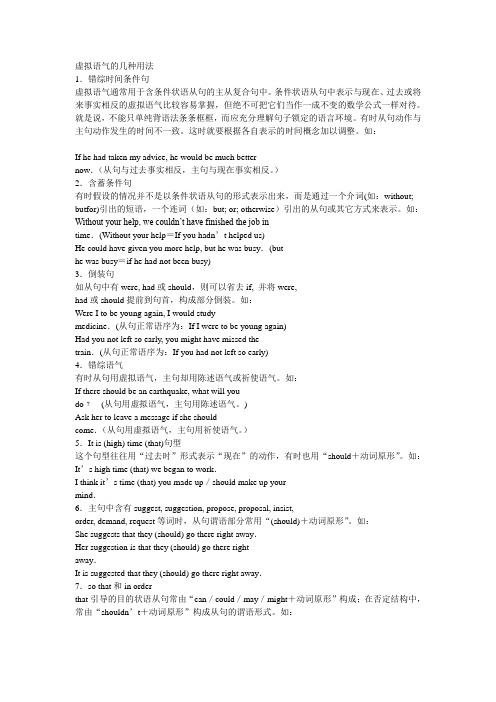
虚拟语气的几种用法1.错综时间条件句虚拟语气通常用于含条件状语从句的主从复合句中。
条件状语从句中表示与现在、过去或将来事实相反的虚拟语气比较容易掌握,但绝不可把它们当作一成不变的数学公式一样对待。
就是说,不能只单纯背语法条条框框,而应充分理解句子锁定的语言环境。
有时从句动作与主句动作发生的时间不一致。
这时就要根据各自表示的时间概念加以调整。
如:If he had taken my advice, he would be much betternow.(从句与过去事实相反,主句与现在事实相反。
)2.含蓄条件句有时假设的情况并不是以条件状语从句的形式表示出来,而是通过一个介词(如:without; butfor)引出的短语,一个连词(如:but; or; otherwise)引出的从句或其它方式来表示。
如:Without your help, we couldn’t have finished the job intime.(Without your help=If you hadn’t helped us)He could have given you more help, but he was busy.(buthe was busy=if he had not been busy)3.倒装句如从句中有were, had或should,则可以省去if, 并将were,had或should提前到句首,构成部分倒装。
如:Were I to be young again, I would studymedicine.(从句正常语序为:If I were to be young again)Had you not left so early, you might have missed thetrain.(从句正常语序为:If you had not left so early)4.错综语气有时从句用虚拟语气,主句却用陈述语气或祈使语气。
虚拟语气用法总结

虚拟语气用法总结虚拟语气是说话者用来表示假设,或难以实现的情况,而非客观存在的事实。
学习虚拟语气,我们需要注意以下几个要点:一、虚拟语气在带有条件状语从句的复合句中的构成和用法。
根据不同的时间,主、从句中动词形式如下表:If we left now, we would arrive in good time. 如果我们现在就走的话,我们就会及时到达。
They would have come to your party if they had had time. 如果他们有时间就会参加你的聚会。
If you lived there for a while, you’d change your mind about the place. 如果你在那儿住上一段时间,你就会改变对那地方的看法。
这里我们需要注意以下三点:1. 错综时间条件句有时条件状语从句中的动作和主句中的动作发生的时间不一致,这时动词的形式要根据它所表示的时间加以调整。
如:If you had listened to the doctor, you would be all right now. 如果你当初听了医生的话,身体现在就好了。
2. 虚拟条件句的倒装形式如果虚拟条件从句中有were, had或should时,可以把if省略,而把这几个词放到主语之前,构成倒装句。
如:Were I you, I wouldn’t go there alone. 如果我是你,我不会一个人去那儿的。
Had he worked harder, he would have got through the exam. 如果他学习再努力点的话,他就会通过考试。
Should you be fired, your health care and other benefits will not be immediately cut off. 如果你被解雇,你的医疗保险和其他权益并不会立即中断。
(完整版)虚拟语气的错综条件句子

虚拟语气的错综条件句子,也就是常说的混合条件句,即虚拟条件从句和主句动作发生的时间不一致,因此,主句和从句的谓语动词应根据所指的时间选用适当的虚拟语气形式。
例如:1)If I were you,I wouldn’t have missed the film last night.如果我是你,我就不会错过昨天晚上的那部电影。
(从句与现在事实相反,主句与过去事实相反。
)2)If he had followed the doctor’s advice,he would recover already.如果他遵照医生的劝告,现在病就好了。
(从句与过去事实相反,主句与现在事实相反。
)混合虚拟语气有时主句和从句的谓语动词指不同的时间,这时需要用混合虚拟语气。
一般来说,在这种情况下,主从句谓语动词指代的时间不同,所以我们又可以错综时间条件句,在这种虚拟情况,动词形式应根据实际情况灵活使用,在做这些题目时候尤其要注意每道题目的提示语:时间状语。
绝大多数情况下,从句或者主句都有相关的时间状语,这是解题的关键。
If you that late movie last night, you wo uldn”t be so sleepy.t be so sleepy.A. hav”t watchedB. didn”t watch t watchC. ha”t watchedD. wouldn”t have watched 答案选C。
Many dead would now be alive if they have not attempted to return for something. Many dead would now be alive if they have not attempted to return for something. Had Paul received six more votes in the last election, he would be our chairman now.混合虚拟语气还有一种情况就是事实和虚拟假设的混合句,这样的句子不仅仅是时间的不同,而重要是事实和假设的混合。
高中虚拟语气用法解析
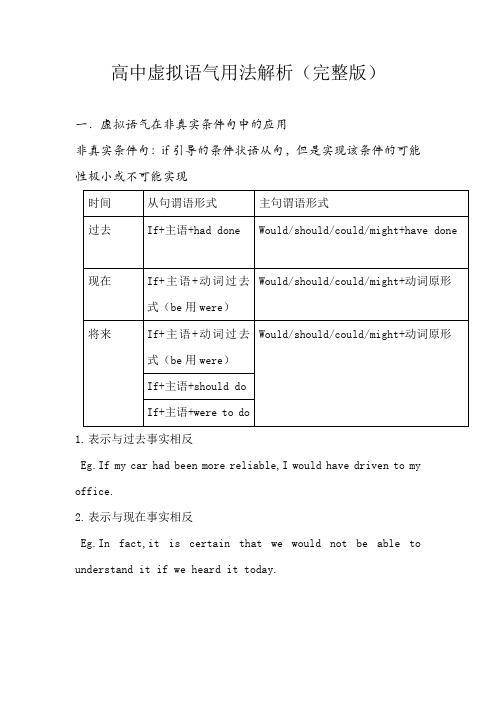
高中虚拟语气用法解析(完整版)一.虚拟语气在非真实条件句中的应用非真实条件句:if引导的条件状语从句,但是实现该条件的可能性极小或不可能实现1.表示与过去事实相反Eg.If my car had been more reliable,I would have driven to my office.2.表示与现在事实相反Eg.In fact,it is certain that we would not be able to understand it if we heard it today.3.表示与将来事实相反Eg.If you succeed,everything would be all right.Grace doesn't want to move to New York because she thinks if she were to live there,she wouldn't be able to see her parents.4.注意事项(1)W as不可以替代were,虚拟语气中,从句中be动词只有were(2)错综时间条件句:条件句的行为和主句行为发生的时间不一致,动词的形式按照主句和从句各自的时间调整。
Eg.If he had listened to me, he would not be in such trouble now. If it had not been raining too much, the crops would be growing much better.(3)虚拟条件句中的谓语动词含有were/ should /had 时,if可省略,而将were/ should /had 置于主语前面Eg.What would have happened had Bob walked farther as far as the river bank?Should he agree to go there, we should send him there. Were it Sunday tomorrow, we should go to the great wall.两个固定搭配:①Were it not for 要不是...就②Had it not been for 要不是...就If it were not for (Were it not for)the bad weather now, we would go to the park to fly kites.If it had not been for(Had it not been for) the bad weather yesterday, we would have gone to the park to fly kites. (4)含蓄虚拟条件句:有时假设的情况不是以if条件句来表示。
虚拟语气之错综语气与特殊句式

1. 如果过去天气好的话,现在庄稼长得更好了.
If the weather ____________finer, had been the crops _______________________still better. would be growing 2.如果你听了老师的建议的话,你现在就不会在医院里
虚拟语气
虚拟语气在 在主语从句中
4.在句型 “It is important (necessary, strange, natural) that .... ” 中,that 后面的从句中的谓语动词用: should + 动词原形 it’s time that +主 +v-ed(should +do ) [例句] 1) It’s necessary that we should have a walk now. 我们有必要出去散散步。 2) It’s natural that she should do so. 她这样做是很自然的。 3) It’s important that we should take good care of the patient. 重要的是我们要照顾好病人。
It’s (about/high) time +that --
过去时 should +V.
你该走了。
It’s high time that you went.
It’s high time that you should go.
我们该睡觉了。
It’s (about) time that we went to bed. It’s time that we should go to bed.
虚拟语气
虚拟语气中的几个特例
公本课堂:虚拟语气中的错综虚拟语气

公本课堂:虚拟语气中的错综虚拟语气
错综虚拟语气:即有时条件从句中的动作和结果主句中的动作所发生的时间不一致
这时,动词的形式应根据它所表示的时间加以调整。
如:
If he had followed the doctor's advice,he would be quite all right now.他当时若是听医生的话,现在就会痊愈了。
(从句说明过去,主句说明现在)
If I were you,I would have gone to the theatre.假如我是你,我会去看话剧了。
(从句的时间包括现在,主句说明过去)
If you hadn't helped me,I couldn't have finished it on time and most likely I would be still working now.假若你没有帮助我,我不可能按时完成工作,很可能现在还在干哩。
(从句说明过去,主句说明过去和现在)
【注意】用直陈语气表示条件和结果
在现代英语里,多用直陈语气表示条件和结果。
直陈语气的条件和结果所表示的往往是事实,这时要遵从“主将从现”原则。
如不是事实,其可能性也较虚拟语气要大。
如:
The dog won't attack you if you sit still.如果你安静地坐着,狗是不会咬你的。
If the rain stops,I'll go for a swim.要是雨停了,我就去游泳。
虚拟语气 错综时间条件句等
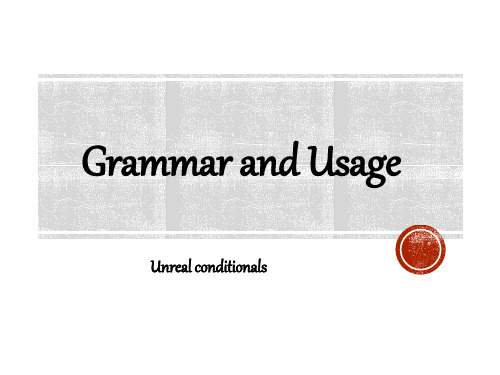
Unreal conditionals
Do you still remember what is an unreal conditional?
An unreal conditional is a statement about an unreal or imaginary condition or situation
Thank you
We use otherwise, or and phrases beginning with with, without and but
for(要不是), were it not for(要是没有), but that(若不是)in place of if
clauses. 要不是他们的帮助,我们就不可能及时完成那些工作。(表过去) But for their help, we could not have finished the work on time.
If I were you, I would spend my holiday in France.
present
future
错综条件虚拟语气主从句谓语动词要按照假设时间而定
Had I finished my homework last night, I would be allowed to watch TV now.
如果我昨晚完成了作业,现在就被允许看电视了(从句说明过去情况,主 句说明现在情况)
如果从句中含有were, had或should等词时,可将if省去,把were, had, should提到主语前
Without your encouragement, I wouldn’t have succeeded. = If you hadn’t encouraged me, I wouldn’t have succeeded.
错综条件虚拟语气用法

错综条件虚拟语气用法1. 什么是虚拟语气虚拟语气是一种特殊的语气,在语法上表示的是与事实相反或假设情况下的一种语气。
它常用于表达愿望、建议、命令、推测、假设等情况。
虚拟语气分为两种形式:条件虚拟语气和假设虚拟语气。
其中条件虚拟语气用来表示与现在或将来事实相反或假设情况下,虚拟的结果,以“If”引导的条件句为其典型结构。
在条件虚拟语气中,它们的形式和用法非常灵活,包括错综条件、过去条件和将来条件。
在本文中,我们将着重讨论错综条件虚拟语气的用法。
2. 错综条件虚拟语气的用法2.1 错综条件虚拟语气的基本结构错综条件虚拟语气的基本结构由两个分句组成:一个条件从句和一个主句。
条件从句用过去完成时表示过去无法实现的虚拟情况,而主句则用过去完成时、过去将来完成时或过去未来完成时表示对过去无法实现的虚拟结果。
以下是几个典型的错综条件虚拟语气句子:•If I had studied harder, I would have passed the exam.(如果我学习更努力,我就会通过考试。
)•If it had rained, we would have stayed at home.(如果下雨了,我们就会呆在家里。
)•If she had caught the train, she would have arrived on time.(如果她赶上了火车,她就会准时到达。
)在上述例子中,我们可以看到过去完成时和过去将来完成时用来表示过去无法实现的虚拟情况和结果。
2.2 错综条件虚拟语气的用途错综条件虚拟语气的主要用途是表达对过去无法实现的虚拟情况和结果。
它可以用于以下几种情况:2.2.1 表达对过去无法实现的虚拟情况当我们希望谈论一个在过去发生的事件,但此事件事实上并未发生时,我们可以使用错综条件虚拟语气来表达这种虚拟情况。
例如:•If I had known you were coming, I would have prepared dinner.(如果我知道你要来,我就会准备晚餐了。
虚拟语气句型 4 (错综时间虚拟条件句)
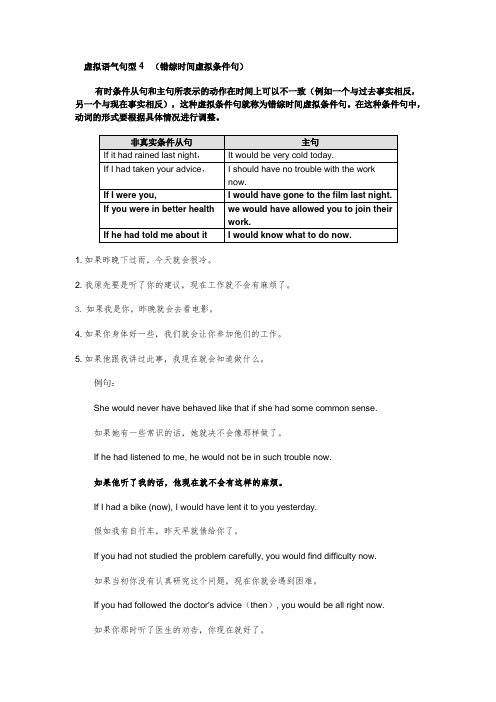
虚拟语气句型 4 (错综时间虚拟条件句)有时条件从句和主句所表示的动作在时间上可以不一致(例如一个与过去事实相反,另一个与现在事实相反),这种虚拟条件句就称为错综时间虚拟条件句。
在这种条件句中,动词的形式要根据具体情况进行调整。
1. 如果昨晚下过雨,今天就会很冷。
2. 我原先要是听了你的建议,现在工作就不会有麻烦了。
3.如果我是你,昨晚就会去看电影。
4. 如果你身体好一些,我们就会让你参加他们的工作。
5. 如果他跟我讲过此事,我现在就会知道做什么。
例句:She would never have behaved like that if she had some common sense.如果她有一些常识的话,她就决不会像那样做了。
If he had listened to me, he would not be in such trouble now.如果他听了我的话,他现在就不会有这样的麻烦。
If I had a bike (now), I would have lent it to you yesterday.假如我有自行车,昨天早就借给你了。
If you had not studied the problem carefully, you would find difficulty now.如果当初你没有认真研究这个问题,现在你就会遇到困难。
If you had followed the doctor's advice(then), you would be all right now.如果你那时听了医生的劝告,你现在就好了。
If you hadn’t finished the homework by now, you would not be allowed to see the film this evening.假如你现在还没有完成作业,就不会允许你今晚去看电影。
句型说明:错综时间条件句中,特别注意时间状语,在这种情况下必须明确给以时间或通过上下文可明白看出时间不同,否则就按前面表格中一般时间搭配使用。
错综虚拟语气的用法归纳

错综虚拟语气的用法归纳
虚拟语气是一种表示虚拟、假设或推测的语气。
它通常通过动词形态的变化来体现,一般用在条件句、愿望句、建议句、命令句等语境中。
错综虚拟语气的用法较为复杂,需要我们仔细分析。
1. 条件句中的错综虚拟语气
如果条件句中的谓语动词是将来时,主句谓语动词要用过去式的虚拟语气,表示假设的情况不可能发生。
例如:如果我有一百万,我会去旅行。
(现在不可能拥有一百万) 如果条件句中的谓语动词是过去式,主句谓语动词要用过去完成时的虚拟语气,表示假设的情况与过去相反。
例如:如果我昨天睡过头了,我就迟到了。
(但实际上我没有迟到)
如果条件句中的谓语动词是过去完成时,主句谓语动词要用过去完成时的虚拟语气,表示过去某个假设的情况并未发生。
例如:如果我昨天没睡过头,我就不会迟到了。
(但实际上我迟到了)
2. 希望句、建议句、命令句中的错综虚拟语气
希望句、建议句、命令句中的虚拟语气通常用于表达对某种情况的期望、建议或命令。
在这些语气中,错综虚拟语气的用法也十分常见。
例如:
希望句:我希望你走的时候把门关上。
(现在的期望)
建议句:如果你不赶紧去看医生,你会更难受的。
(假设的建议) 命令句:如果你再这样做,我就报警了。
(假设的命令)
总之,错综虚拟语气是一种较为复杂的语法现象,需要我们在实际运用中多多练习,才能准确地掌握其用法。
高中英语知识点归纳虚拟语气的常见错误使用

高中英语知识点归纳虚拟语气的常见错误使用虚拟语气(Subjunctive Mood)是英语语法中的一种特殊语气形式,用于表示说话人的愿望、建议、假设、怀疑、命令等情态。
虚拟语气在高中英语学习中是一个重要的知识点,但很多学生在使用虚拟语气时存在一些常见的错误。
本文将对这些错误进行归纳总结,并提供正确的用法。
一、错误使用“if引导虚拟条件句”在虚拟条件句中,通常使用“if”引导从句,但有时学生会错误地使用“when”、“unless”、“while”等词语来引导从句。
正确的做法是使用“if”引导虚拟条件句。
错误示例:1. When he will come, I will be happy.(当他来的时候,我会很开心。
)2. Unless it will rain, we will have a picnic.(除非下雨,否则我们会去野餐。
)正确示例:1. If he comes, I will be happy.(如果他来,我会很开心。
)2. If it doesn't rain, we will have a picnic.(如果不下雨,我们会去野餐。
)二、错误使用虚拟条件句的时态虚拟条件句中的谓语动词应该使用过去时态,而不是现在时态。
有时学生会错误地使用现在时态来表示虚拟条件。
正确的做法是使用过去时态或过去完成时态。
错误示例:1. If he is rich, he will buy a car.(如果他有钱,他会买一辆车。
)2. If I have studied harder, I will pass the exam.(如果我学得更努力些,我就能通过考试。
)正确示例:1. If he were rich, he would buy a car.(如果他有钱的话,他会买辆车。
)2. If I had studied harder, I would have passed the exam.(如果我当初学得更努力些,我就能通过考试了。
虚拟语气的用法归纳
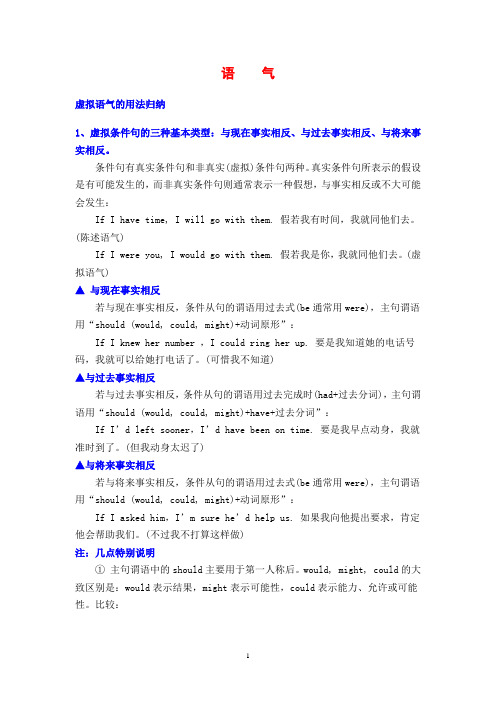
语气虚拟语气的用法归纳1、虚拟条件句的三种基本类型:与现在事实相反、与过去事实相反、与将来事实相反。
条件句有真实条件句和非真实(虚拟)条件句两种。
真实条件句所表示的假设是有可能发生的,而非真实条件句则通常表示一种假想,与事实相反或不大可能会发生:If I have time, I will go with them. 假若我有时间,我就同他们去。
(陈述语气)If I were you, I would go with them. 假若我是你,我就同他们去。
(虚拟语气)▲与现在事实相反若与现在事实相反,条件从句的谓语用过去式(be通常用were),主句谓语用“should (would, could, might)+动词原形”:If I knew her number ,I could ring her up. 要是我知道她的电话号码,我就可以给她打电话了。
(可惜我不知道)▲与过去事实相反若与过去事实相反,条件从句的谓语用过去完成时(had+过去分词),主句谓语用“should (would, could, might)+have+过去分词”:If I’d left soone r,I’d have been on time. 要是我早点动身,我就准时到了。
(但我动身太迟了)▲与将来事实相反若与将来事实相反,条件从句的谓语用过去式(be通常用were),主句谓语用“should (would, could, might)+动词原形”:If I asked him,I’m sure he’d help us. 如果我向他提出要求,肯定他会帮助我们。
(不过我不打算这样做)注:几点特别说明①主句谓语中的should主要用于第一人称后。
would, might, could的大致区别是:would表示结果,might表示可能性,could表示能力、允许或可能性。
比较:If you tried again ,you would succeed. 要是你再试一试,你就会成功的。
错综时间虚拟条件句
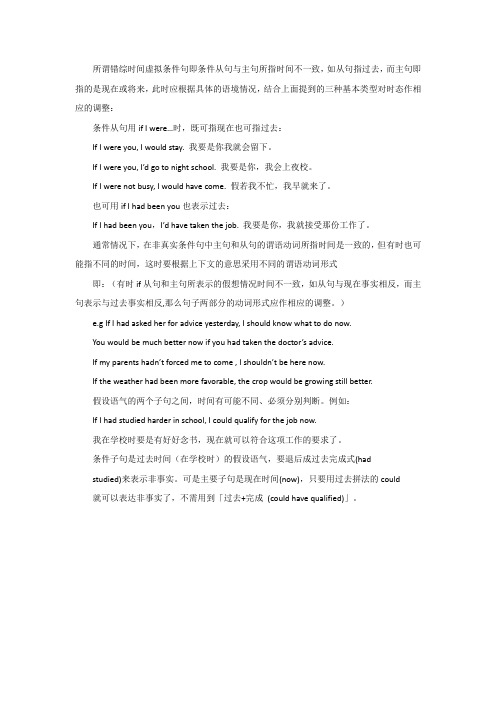
所谓错综时间虚拟条件句即条件从句与主句所指时间不一致,如从句指过去,而主句即指的是现在或将来,此时应根据具体的语境情况,结合上面提到的三种基本类型对时态作相应的调整:条件从句用if I were…时,既可指现在也可指过去:If I were you, I would stay. 我要是你我就会留下。
If I were you, I’d go to night school. 我要是你,我会上夜校。
If I were not busy, I would have come. 假若我不忙,我早就来了。
也可用if I had been you也表示过去:If I had been you,I’d have taken the job. 我要是你,我就接受那份工作了。
通常情况下,在非真实条件句中主句和从句的谓语动词所指时间是一致的,但有时也可能指不同的时间,这时要根据上下文的意思采用不同的谓语动词形式即:(有时if从句和主句所表示的假想情况时间不一致,如从句与现在事实相反,而主句表示与过去事实相反,那么句子两部分的动词形式应作相应的调整。
)e.g If I had asked her for advice yesterday, I should know what to do now.You would be much better now if you had taken the doctor’s advice.If my parents hadn’t forced me to come , I shouldn’t be here now.If the weather had been more favorable, the crop would be growing still better.假设语气的两个子句之间,时间有可能不同、必须分别判断。
例如:If I had studied harder in school, I could qualify for the job now.我在学校时要是有好好念书,现在就可以符合这项工作的要求了。
虚拟语气

虚拟语气
一、虚拟语气的概念
陈述语气:表示客观真实,语气较强
虚拟语气:表示主观假设,语气较弱
一般使用的情态动词为would/could/should/might简写为wcsm 解题步骤:①判断那种类型的虚拟②判断主句/从句③判断时态二、一般条件句的虚拟语气
三、特殊条件句的虚拟语气
①错综条件句(从句过去式,主句现在式)
②省略条件句(从句倒装,主句正常)
③含蓄条件句
without/but for的含蓄条件句一般翻译为:要是没有.... but的含蓄条件句一般翻译为:....但是....
or/otherwise的含蓄条件句一般翻译为:....否则.....
四、其他句型的虚拟语气
①时间型
②should型。
错综时间虚拟条件句
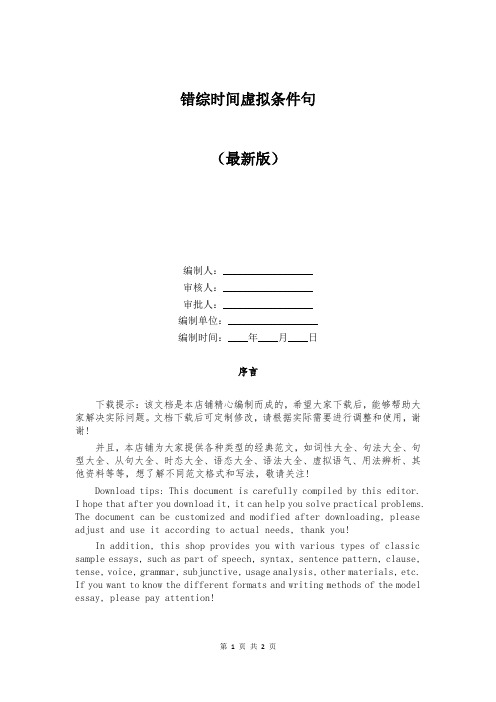
错综时间虚拟条件句(最新版)编制人:__________________审核人:__________________审批人:__________________编制单位:__________________编制时间:____年____月____日序言下载提示:该文档是本店铺精心编制而成的,希望大家下载后,能够帮助大家解决实际问题。
文档下载后可定制修改,请根据实际需要进行调整和使用,谢谢!并且,本店铺为大家提供各种类型的经典范文,如词性大全、句法大全、句型大全、从句大全、时态大全、语态大全、语法大全、虚拟语气、用法辨析、其他资料等等,想了解不同范文格式和写法,敬请关注!Download tips: This document is carefully compiled by this editor.I hope that after you download it, it can help you solve practical problems. The document can be customized and modified after downloading, please adjust and use it according to actual needs, thank you!In addition, this shop provides you with various types of classic sample essays, such as part of speech, syntax, sentence pattern, clause, tense, voice, grammar, subjunctive, usage analysis, other materials, etc. If you want to know the different formats and writing methods of the model essay, please pay attention!错综时间虚拟条件句在高中,一些学生在学习虚拟语气时,不清楚什么是错综时间虚拟条件句,今天我给大家简单说明一下:当条件状语从句表示的行为和主句表示的行为所发生的时间不一致时,被称为“错综时间条件句”,动词的形式要根据它所表示的时间作出相应的调整。
- 1、下载文档前请自行甄别文档内容的完整性,平台不提供额外的编辑、内容补充、找答案等附加服务。
- 2、"仅部分预览"的文档,不可在线预览部分如存在完整性等问题,可反馈申请退款(可完整预览的文档不适用该条件!)。
- 3、如文档侵犯您的权益,请联系客服反馈,我们会尽快为您处理(人工客服工作时间:9:00-18:30)。
虚拟语气的错综条件句子,也就是常说的混合条件句,即虚拟条件从句和主句动作发生的时间不一致,因此,主句和从句的谓语动词应根据所指的时间选用适当的虚拟语气形式。
例如:1)If I were you,I wouldn’t have missed the film last night.如果我是你,我就不会错过昨天晚上的那部电影。
(从句与现在事实相反,主句与过去事实相反。
)
2)If he had followed the doctor’s advice,he would recover already.如果他遵照医生的劝告,现在病就好了。
(从句与过去事实相反,主句与现在事实相反。
)
混合虚拟语气
有时主句和从句的谓语动词指不同的时间,这时需要用混合虚拟语气。
一般来说,在这种情况下,主从句谓语动词指代的时间不同,所以我们又可以错综时间条件句,在这种虚拟情况,动词形式应根据实际情况灵活使用,在做这些题目时候尤其要注意每道题目的提示语:时间
状语。
绝大多数情况下,从句或者主句都有相关的时间状语,这是解题的关键。
If you that late movie last night, you wo uldn”t be so sleepy.t be so sleepy.
A. hav”t watched
B. didn”t watch t watch
C. ha”t watched
D. wouldn”t have watched 答案选C。
Many dead would now be alive if they have not attempted to return for something. Many dead would now be alive if they have not attempted to return for something. Had Paul received six more votes in the last election, he would be our chairman now.混合虚拟语气还有一种情况就是事实和虚拟假设的混合句,这样的句子不仅仅是时间的不同,而重要是事实和假设的混合。
I would have gone to visit him in the hospital had it been at all possible, but I was fully occupied the whole of last week.n the hospital had it been at all possible, but I was fully occupied the whole of last week.该句前半部分是假设虚拟,而后半部分是事实的陈述。
Your math instructor would have been happy to give you a make-up examination had you gone and explained that your parents were ill at the time. e time.该句前半句用的是假设虚拟,后半句主句也用的是假设虚拟(如果你去并且解释的话),但是后半句的从句用的是事实语气,因为“父母病了”是客观事实,故不需要用虚拟形式had been。
